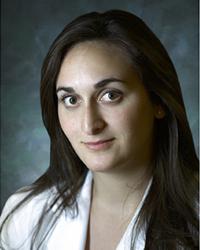Keratoconus

Keratoconus affects the cornea, the clear tissue covering the front of your eyes.
The cornea changes shape from round to cone-shaped and becomes thinner, causing the eye to bulge. It usually affects both eyes, but one eye may be worse.
The cause of keratoconus is unknown, but defective collagen — tissue that shapes and strengthens the cornea — may be a risk factor.
Keratoconus is likely present at birth. Typically diagnosed in adolescents or young adults, its symptoms usually become worse until the mid-30s, when they may stop progressing.
Keratoconus Symptoms
Slightly blurred vision that glasses cannot correct is the earliest symptom. Halos, glare and night vision difficulties may develop over time. Many people who develop keratoconus are nearsighted.
At University of Maryland Eye Associates, we use corneal topography, which maps the curve of the cornea, to diagnose keratoconus. We measure the thickness of the cornea with a test called pachymetry.
Keratoconus Treatment
Contact lenses are the usual remedy for mild to moderate keratoconus, but these don’t stop its progression. If you have keratoconus, wearing sunglasses outdoors may prevent it from worsening.
Over time, as the shape of your cornea changes, you may need different types of contact lenses. Eventually, if your keratoconus continues to progress, surgeries or other treatments to change the shape of the cornea may be required. These include:
Corneal Cross-Linking
This stiffens the cornea and is the only known treatment that can actually stop the progression of keratoconus. However, since it does not reverse the disease, contact lenses are usually still needed to see clearly. Corneal cross-linking is most effective early in the progression of keratoconus.
Corneal Transplant
A small percentage of people with keratoconus eventually require corneal transplant surgery.
Make an Appointment
Learn more about keratoconus or make an appointment with one of our cornea specialists, please call 667-214-1111.


